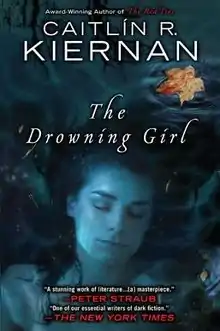The Drowning Girl
The Drowning Girl: A Memoir is a 2012 novel by American writer Caitlín R. Kiernan, set in Providence, Rhode Island.[1] The story's protagonist and unreliable narrator, India Morgan Phelps (also known as Imp), has schizophrenia.[2]
 Cover of 2012 Penguin paperback | |
| Author | Caitlín R. Kiernan |
|---|---|
| Country | United States |
| Language | English |
| Genre | Science fiction/dark fantasy |
| Publisher | Roc Books (Penguin) |
Publication date | March 6, 2012 |
| Media type | Paperback |
| Pages | 352 pp. |
| Awards | James Tiptree, Jr. Award (won) Bram Stoker Award for Novel (won) Nebula Award for Best Novel (nom.) Locus Award for Best Fantasy Novel (finalist) Shirley Jackson Award (nom.) Mythopoeic Award (nom.) |
| ISBN | 9780451464163 |
| Preceded by | The Red Tree (2009) |
| Followed by | Blood Oranges (2013) |
It has been described as an "eerie masterpiece of literary horror and dark fantasy" containing elements of magical realism.[3] It has also been described as semi-autobiographical.[4] The novel has been translated into a number of languages, including French, German, Polish, Portuguese, Spanish, Romanian, and Turkish.
Synopsis
The Drowning Girl follows the story of India Morgan Phelps, an unreliable narrator struggling with hereditary mental illness. India states that she has decided to write down the bizarre events that occurred two years ago (the entirety of the novel is written as a fictionalized memoir). Early in the novel, she befriends her eventual roommate and lover, a transgender woman named Abalyn Armitage. India works at an art supply store, but she is also a painter and a writer.
One night, India picks up a hitchhiker named Eva Canning, whom she finds stranded and naked on the side of the road, although India is unable to pinpoint whether she met Eva in July or November. Eva stays with India only for a short while (much to Abalyn's chagrin) before the mysterious woman takes off on her own, but apparently continues to stalk India. This sparks India's obsession with Canning and her past. India's obsession eventually causes Abalyn to leave her.
India often deals with traumatic events by writing short stories. Some of them relate to Eva Canning, while others revolve around a mysterious artists Phillip George Saltonstall and Albert Perrault, as well as a painting titled "The Drowning Girl," which India saw on display at a museum as a child.
After running into Abalyn and her new girlfriend, India begins to lose her grasp on what is real and what isn't. As a result of her inability to tell fact from fiction, her growing obsession with Eva Canning, and Abalyn's abandonment, India suffers a mental breakdown. India stops taking her medication, stops eating, and neglects phone calls from concerned people such as Abalyn, her therapist, her boss (who fires her), and her aunt. India begins to paint and write obsessively until Abalyn finds her half-dead in her apartment.
With the help of Abalyn, India discovers that Eva Canning's mother (also named Eva) was part of a cult lead by a woman known as Jacova Anjevine, who committed mass suicide with her followers by walking into the sea some years prior. Eva was apparently the only survivor of said mass suicide. India believes that Eva might be a ghost or a sea-dwelling creature of some sort in a human disguise, but the story is vague as to whether India actually encounters any supernatural phenomena.
India eventually does meet Eva Canning, and the two have a bizarre sexual encounter during which Canning appears to morph into a fish-like creature. Eva confesses to India that she wishes to go to the sea to be with her mother, which India obliges by taking her to the beach, at which point Eva walks into the water. After India calls out to her, Eva looks back and tells her to "join the dance". India tells the reader that she doesn't know whether or not to run into the water after Eva.
India reunites with Abalyn, and it is implied they are still together at the end of the novel. Eva's body washes up on the shore sometime after.
Awards
References
- Elizabeth Bear (January 13, 2012), "The Drowning Girl review", Elizabeth Bear blog
- Downs, Alison (March 1, 2012), "The Drowning Girl", The Booklist, 108 (13): 53(subscription required)
- Cassada, Jackie (March 15, 2012), "Science Fiction/Fantasy, March 15, 2012", Library Journal, 137 (5), retrieved 2013-05-13
- Elizabeth Donovan (February 22, 2012), Rhode Island Voices: Caitlin Kiernan, Kingstown, Rhode Island: North Kingstown Free Library, retrieved 2013-05-13
- 2012 Tiptree Award Winner announced, James Tiptree, Jr. Literary Award Council, retrieved 2013-05-13
- 2012 Nebula Awards Nominees Announced, SFWA, February 20, 2013
- 2013 Locus Awards Finalists, Locus Science Fiction Foundation, retrieved 2013-05-13
- Nominees for the 2012 Shirley Jackson Awards, Shirley Jackson Awards, May 2013, retrieved 2013-05-13
- 2013 Mythopoeic Award Finalists Announced, Mythopoeic Society, May 14, 2013, archived from the original on July 2, 2013, retrieved 2013-05-18
- 2013 World Fantasy Award Nominees, World Fantasy Board, 2013, archived from the original on 2013-08-17, retrieved 2013-09-10